Jan Amos Komensky: an educational reformer
By Tracy A. Burns
A symbol of the Czech nation
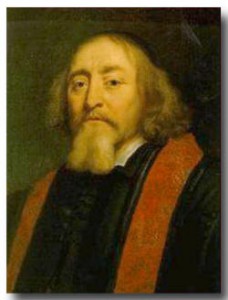 This 17th-century religious and educational reformer was fiercely Protestant, a member of the Unity of the Brethren denomination (also called Unitas Fratrum) and its last bishop. His work and life focus on his relationship with God, and he became a religious refugee on more than one occasion, residing in Sweden, the Holy Roman Empire, England, the Netherlands, and other countries. Jan Amos Comenius (Komenský in Czech) scribed influential textbooks, encyclopedias, dictionaries, and philosophical and theological studies. He even wrote one of the most significant works of Czech literature, the allegorical The Labyrinth of the World and Paradise of the Heart. Some of his reforms of the school system are still in use today. Comenius contributed greatly to universal education, and it is no wonder that he is considered a symbol of the Czech nation.
This 17th-century religious and educational reformer was fiercely Protestant, a member of the Unity of the Brethren denomination (also called Unitas Fratrum) and its last bishop. His work and life focus on his relationship with God, and he became a religious refugee on more than one occasion, residing in Sweden, the Holy Roman Empire, England, the Netherlands, and other countries. Jan Amos Comenius (Komenský in Czech) scribed influential textbooks, encyclopedias, dictionaries, and philosophical and theological studies. He even wrote one of the most significant works of Czech literature, the allegorical The Labyrinth of the World and Paradise of the Heart. Some of his reforms of the school system are still in use today. Comenius contributed greatly to universal education, and it is no wonder that he is considered a symbol of the Czech nation.
Humble beginnings
Born March 28, 1592, Comenius hailed from southeast Moravia, though the exact whereabouts are unknown. He may have been from Komňa, Nivnice or Uherský Brod. His father chose the name Komenský, which means “the man from Komňa.” Comenius was schooled in religion at a young age; his parents supported the Moravian Brethren branch of Unitas Fratrum, which was established in Bohemia in 1457. The youngest child and only son of the poverty-stricken Martin and Anna had four older sisters. He experienced tragedy when he was 12 years old. In 1604 his parents and two of his sisters passed away. Comenius moved in with his aunt in Strážnice. When he was 16 years old, he began to attend the Latin school in Přerov and continued at the Herborn high school from 1611 to 1613. While studying there, he helped a professor organize an encyclopedia and started to create his own dictionary and encyclopedia, though they were never finished. The school emphasized theories that worked in practice, a basis for Comenius’ philosophy. He then went to the University of Heidelberg but only lasted one semester. Before leaving home, Comenius had adopted the middle name “Amos,” after the Biblical prophet.
The Moravian Brethren
When he was 22 years old, Comenius served as rector of the school he had attended in Přerov. He was ordained by the Moravian Brethren, a denomination that focuses on the love of God in Christ. The religion hails back to the preaching of Czech priest and philosopher Jan Hus, who was burned at the stake for heresy in 1415. Hus made the Scriptures available to his followers in Czech. He also believed that people should have the right to both elements of communion. Members of the Unity of the Brethren translated the Bible into Czech at the end of the 16th century. The Christian denomination is still active today. Following Hus’ beliefs, Comenius became pastor and rector in Žeravice in 1616 and then at Fulnek church in 1618. There he met his first wife, Magdalena Vizovska.
The Estates Uprising
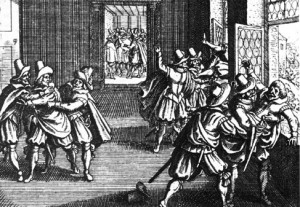 The marriage would be short-lived, and historical developments would not turn in Comenius’ favor. In 1617 the fiercely Catholic Ferdinand of Styria was elected Crown Prince of Bohemia and the future king of that region. Protestants were irate. When Ferdinand sent two councilors to Prague to organize the government in 1618, Protestants threw them out a window, triggering the Bohemian Revolt. This Protestant-Catholic clash spread to Moravia and throughout Europe. At the Battle of White Mountain on November 8, 1620, the Catholics defeated the Bohemian Protestants, delivering non-Catholics a devastating blow. This marked the end of the Bohemian chapter in The Thirty Years’ War. Protestants were forced to endure even more suffering and turmoil. When the Protestant nobles lost to the Catholics in the Estates Uprising of 1621, Comenius had to flee from Fulnek and go into hiding. All his writings, stored at the Fulnek town hall, were burned during a Catholic mass in May of 1623. In 1622 he had not fared much better. His wife and two of his children had become victims of the plague. While secretly working in Brandýs nad Orlicí of the eastern Czech lands during 1624, Comenius courted his second wife, Marie Dorota Cyrillová. Together they had three daughters and a son.
The marriage would be short-lived, and historical developments would not turn in Comenius’ favor. In 1617 the fiercely Catholic Ferdinand of Styria was elected Crown Prince of Bohemia and the future king of that region. Protestants were irate. When Ferdinand sent two councilors to Prague to organize the government in 1618, Protestants threw them out a window, triggering the Bohemian Revolt. This Protestant-Catholic clash spread to Moravia and throughout Europe. At the Battle of White Mountain on November 8, 1620, the Catholics defeated the Bohemian Protestants, delivering non-Catholics a devastating blow. This marked the end of the Bohemian chapter in The Thirty Years’ War. Protestants were forced to endure even more suffering and turmoil. When the Protestant nobles lost to the Catholics in the Estates Uprising of 1621, Comenius had to flee from Fulnek and go into hiding. All his writings, stored at the Fulnek town hall, were burned during a Catholic mass in May of 1623. In 1622 he had not fared much better. His wife and two of his children had become victims of the plague. While secretly working in Brandýs nad Orlicí of the eastern Czech lands during 1624, Comenius courted his second wife, Marie Dorota Cyrillová. Together they had three daughters and a son.
Into exile again
Four years later he was on the run once again, this time making Leszno, Poland his new home. Many supporters of the Unity of the Brethren lived in this town. There, he tried to persuade world leaders not to persecute members of his religion. He also concentrated on his religious work and teaching activities. He wrote textbooks, for instance. He also penned The Gates of Languages Unlocked in 1631, a textbook that brought him much fame in non-Catholic circles of Europe. Comenius helped reform the school systems in Sweden and England, too, residing in those countries as well during the 1640s. In 1648 his second wife died. But he was not alone for very long. Only a year after her death he married for the third time, tying the knot with Jana Gajusová, who was more than 30 years younger than he.
In Transylvania and Poland again
Comenius left Poland for Transylvania in 1650, when he took up the position of professor at the first Hungarian Protestant College and scribed some of his most influential books. He returned to Poland in 1654. More tragedy was yet to come. During the Northern Wars of 1655, the Poles lost to the Protestant Swedes, whom Comenius had aided. Polish rebels got revenge by burning down his house and destroying his manuscripts, including the Czech-Latin dictionary he had worked on for most of his life.
At peace in Amsterdam
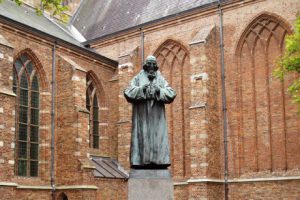 In 1656 Comenius took refuge in Amsterdam, where he knew painter Rembrandt van Rijn. While living there, he saw 43 volumes of his works come into print – about half of his total output. He died 14 years later, after a long illness, on November 15, 1670, and is buried in Naarden.
In 1656 Comenius took refuge in Amsterdam, where he knew painter Rembrandt van Rijn. While living there, he saw 43 volumes of his works come into print – about half of his total output. He died 14 years later, after a long illness, on November 15, 1670, and is buried in Naarden.
Philosophy
Comenius’ philosophy involves allowing all children to receive an education. Children should get to know themselves and the world through learning. He also emphasized moral and religious education. Comenius believed in encouraging children to form ideas via pictures rather than words and promoting universal education. He was strongly against administering physical punishment when students made mistakes. He thought that after students finish school, they should devote some time to traveling. The reformer also emphasized that a person’s education never really ends. Comenius planned the duration of the school year, the school week, and the vacation period. He also stressed that students of the same age should learn together. He believed that parents and teachers should set examples for children.
His writings
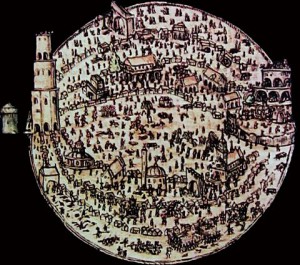 Comenius wrote in Czech, Latin, and German. Most of his books fall into the theological or philosophical realm and are characterized by hope, even though he experienced so much tragedy. Many of his books are at least in part autobiographical. He also authored more than 40 textbooks and numerous encyclopedias. His textbook The World in Pictures received much acclaim and greatly influenced the educational system by emphasizing the use of illustrations in teaching. One of his prominent works was Didactica Magna, which organized the school system in a way similar to the current American system, delineating kindergarten, elementary school, secondary school, college, and university levels. A jewel of Czech literature, his The Labyrinth of the World and Paradise of the Heart features a pilgrim experiencing deceit, futility, and poverty in a world that appears to be a labyrinth. Yet he does not surrender to the vices of this world. Longing to flee, he finally turns inward and finds God.
Comenius wrote in Czech, Latin, and German. Most of his books fall into the theological or philosophical realm and are characterized by hope, even though he experienced so much tragedy. Many of his books are at least in part autobiographical. He also authored more than 40 textbooks and numerous encyclopedias. His textbook The World in Pictures received much acclaim and greatly influenced the educational system by emphasizing the use of illustrations in teaching. One of his prominent works was Didactica Magna, which organized the school system in a way similar to the current American system, delineating kindergarten, elementary school, secondary school, college, and university levels. A jewel of Czech literature, his The Labyrinth of the World and Paradise of the Heart features a pilgrim experiencing deceit, futility, and poverty in a world that appears to be a labyrinth. Yet he does not surrender to the vices of this world. Longing to flee, he finally turns inward and finds God.
His legacy
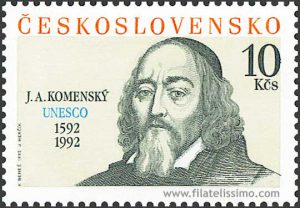 Comenius has been a major influence on education since the 19th century when Czech patriots promoted him as a symbol of their nation during the Czech National Revival. His legacy is impressive. For example, Comenius University was founded in Bratislava in 1919. Comenius’ birthday has been declared Teachers’ Day in the Czech Republic and Slovakia. The University of Jan Komenský also exists in Prague. A Comenius Foundation has been set up in Poland. UNESCO awards the Comenius Medal to a person who has greatly influenced education.
Comenius has been a major influence on education since the 19th century when Czech patriots promoted him as a symbol of their nation during the Czech National Revival. His legacy is impressive. For example, Comenius University was founded in Bratislava in 1919. Comenius’ birthday has been declared Teachers’ Day in the Czech Republic and Slovakia. The University of Jan Komenský also exists in Prague. A Comenius Foundation has been set up in Poland. UNESCO awards the Comenius Medal to a person who has greatly influenced education.



